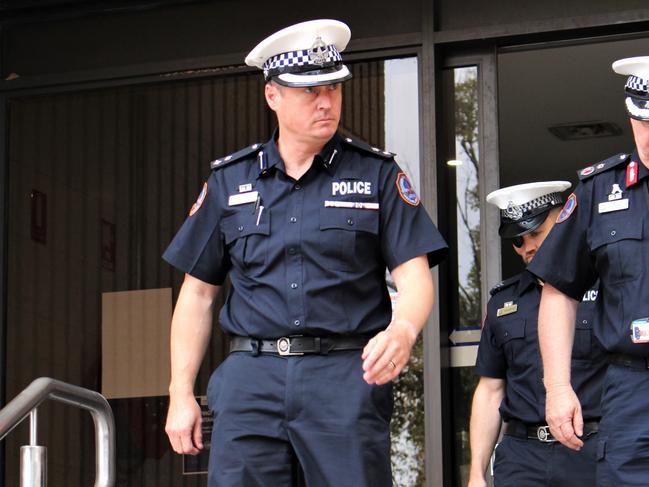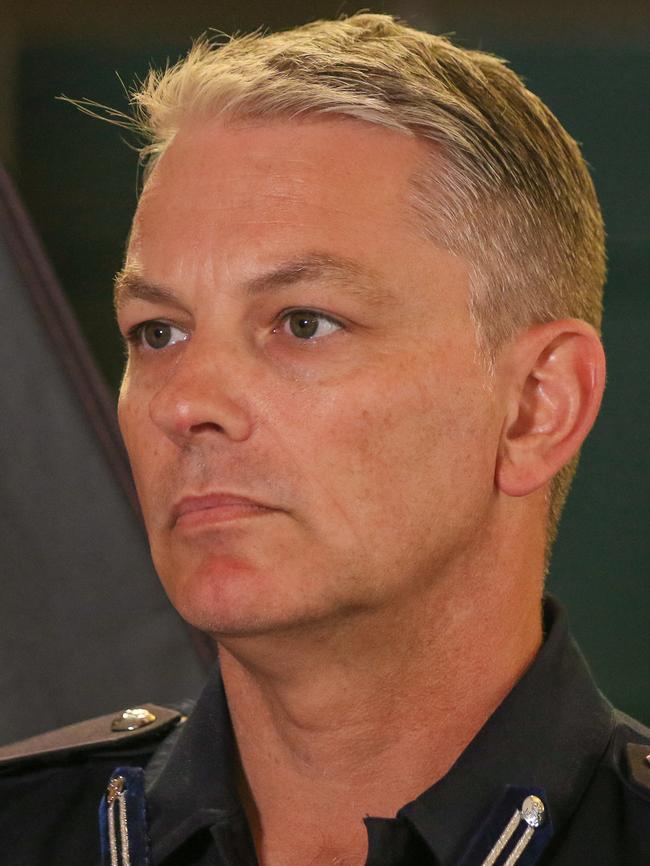Kumanjayi Walker inquest: Racist Zach Rolfe texts ‘not isolated’, Superintendent Jody Nobbs admits
An NT Police superintendent has admitted racist text messages between Zach Rolfe and other serving cops are ‘broader than an isolated issue’.
Police & Courts
Don't miss out on the headlines from Police & Courts. Followed categories will be added to My News.
An NT Police superintendent has become the highest ranking officer to admit racist text messages between Zach Rolfe and other serving cops are “broader than an isolated issue”.
The messages were revealed during an ongoing inquest into the shooting death of 19-year-old Warlpiri man Kumanjayi Walker.
Mr Walker was killed by Constable Rolfe during a botched arrest in 2019.
In March, Constable Rolfe was acquitted by a Supreme Court jury on all charges relating to the shooting.
On Tuesday, Superintendent Jody Nobbs took the stand in the Alice Springs Local Court where the inquest before Coroner Elisabeth Armitage has now entered its fourth week.
Counsel assisting Peggy Dwyer asked Superintendent Nobbs what he would have done if he had been aware of Constable Rolfe’s “boasting” about having a “licence to towel up locals”, who he referred to as “c**ns” and “Neanderthals”, at the time.
“Certainly comments such as these are comments that would have the tendency to bring the organisation into disrepute and erode the confidence the community would have in police,” he said.
“So accordingly, I would operate within the Police Administration Act to deal with it through the formal disciplinary process.
“That said, I would still be having conversations to see what underpins this thinking, because I want to have, rather than just in isolation, a disciplinary action, I’d also want to try to have an appreciation of how and why we’ve got to the stage we’ve got to.”

Dr Dwyer cited a text message from a serving police sergeant to Constable Rolfe in which the unnamed sergeant also used a racial slur, and asked Superintendent Nobbs whether he would want to know whether that person was aware of the comments.
“I’d certainly want to have an appreciation of how widespread it is and whether this was a symptom of something more egregious,” he said.
“And you’d want to know, wouldn’t you, is it a symptom of some mental health decline, or is it a symptom of someone having nasty, racist attitudes towards Aboriginal people?” Dr Dwyer asked.
Superintendent Nobbs replied: “Certainly.”
In response, Superintendent Nobbs said he acknowledged “that this is a broader issue, broader than an isolated issue”.
“It’s certainly attitudes that I wouldn’t want permeating across what I consider to be a very necessary, functional unit, so I’d be certainly dealing, not only with the sergeant, but any of the officers that shared those views,” he said.
Superintendent Nobbs said he was “a strong supporter” of the concept of the Immediate Response Team Constable Rolfe had been deployed with on the night of Mr Walker’s death “as a national best practice model”, making the texts all the more “incredibly disappointing”.
“I’ve advocated quite strongly for the IRT in the past and continue to advocate for an IRT concept going forward,” he said.
“So it’s really, sort of, derailed any sort of reasonable and clinical and considered conversations that anyone would have in relation to the IRT concept, so I find it extremely disappointing and quite frustrating.”
Dr Dwyer asked for Superintendent Nobbs’ views on an online opinion piece penned by a former NT Police officer, claiming the revelations meant “the last bastion of camaraderie has now been destroyed, because police officers can’t feel free to talk to each other in that language”.
Superintendent Nobbs responded by saying there was “no justification for anyone speaking to anyone in such vulgar language”.
“It’s certainly disappointing that that’s, I won’t say the prevailing attitude, but certainly the attitude of some,” he said.
But Superintendent Nobbs agreed it was “healthy to flush that stuff out and become aware of it so that you can deal with it”.
“We’re an agency that is constantly trying to grow and develop, and sometimes it takes for someone, potentially, to check our blind spot and tell us that we’re not quite up to the par,” he said.
“It’s that robust and considered conversation that brings about meaningful reform.”
Earlier, another senior NT Police officer who described “Warlpiris with the surname of Walker” as “my nemesis” in the lead up to Kumanjayi Walker’s death told the court he meant no offence.
Assistant Commissioner Travis Wurst became the most senior officer to take the stand on Monday, when Dr Dwyer, read from an email Mr Wurst sent to a colleague, Chris Hand, who Mr Walker had threatened with an axe three days before his death in November 2019.
Counsel assisting the Coroner, Peggy Dwyer, read from an email Mr Wurst sent to a colleague, Chris Hand, who Mr Walker had threatened with an axe three days before his death in November 2019.
“Are you all right? I see the Warlpiris with the surname of Walker are still ours and my nemesis, Travis,” the email read.
When Dr Dwyer asked Mr Wurst why he sent the email, he described it as a “welfare check” but admitted the word “nemesis” was “an extremely poor choice of words”.
“However, when Senior Constable Hand and I were at Yuendumu there were a group of men with the surname Walker, who were all Warlpiri men,” he said.

“There were five and they were such that we had lots and lots of interactions with them, some of which were violent and many of which required them being apprehended for various things at various times.
“That happened consistently throughout our entire time at Yuendumu and they were a challenging group of people to deal with because of the violence that they were capable of.”
But Mr Wurst said he did not “mean any offence” by the word “nemesis”.
“It was just to suggest that that surname was a surname that was synonymous with some of the time that we’d spent at Yuendumu around our interactions,” he said.
Dr Dwyer also again read from text messages between Constable Zach Rolfe – who was acquitted on all charges in relation to the shooting in March – and other police officers, which included several racial slurs against Aboriginal people.
Mr Wurst said the language “undermines the culture of being a police officer in this agency and what it means to wear this uniform”.
“If that language was made apparent to myself and my team, we would have dealt with it,” he said.
“I mean obviously there’s a disciplinary pathway, but it’s more than that, it’s about the culture and the impact that was having on those individuals, and why they were using that language, and get to the heart where that language comes from and why it’s even being utilised in that, whatever context it was being used in.”
Mr Wurst said he did not accept the messages were “just people letting off steam”.
“I didn’t accept it previously, I don’t accept it now, it’s indicative of someone’s personal biases toward a cultural group that has the ability to impact on their ability to do their job, a job that we must do without fear or favour, and objectively,” he said.
“You cannot have that language seeping into the workplace, or in a private context, it doesn’t matter, because it has the ability to influence your ability to do your job.”
Mr Wurst agreed the use of such racist language could “lead to dehumanising people” and “potentially” to “decisions being made about use of force that are inappropriate”.
The inquest continues on Tuesday.




